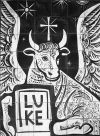
The Gospel of Luke
Earthly events: Lk 21,5-24
Opening Dialogue: 21,5-9
21,5-6 are equivalent to the beginning of Mark chapter 13, Mk 13,1-2. We can note that the poor widow incident at the end of Mark chapter 12 now begins the next chapter in Luke.
Luke does not say that Jesus was leaving the Temple as do Mark and Matthew. He does rather highlight the splendour of the Temple. The message of Jeremiah (Jer 7,1-4) is not to trust in the building itself.
He has thus made verses 5-9 into a unity by leaving out the move to the Mount of Olives (Mk 13,3). The opening line of verse 10 "then he said to them" forms a beginning unique to Luke.
Verse 7 has Jesus addressed as Teacher as in Mk 13,1. In Mark and Matthew, it is said that it is the disciples who come to Jesus privately. Luke omits "privately" and makes this a more public discourse. The last mention of an audience was the disciples in 20,45 but Luke added "in the hearing of all".
The two questions in verse 7 are "when" and "where" to which Jesus gives an initial response in verses 8 and 9. The verbs here are imperatives: Watch out; do not follow, do not be frightened.
In verse 9, Luke has added "first" to the events and "immediately" for the end. Given that the background is a destroyed Jerusalem as will be described in 21,20-24, Luke's message is "don't panic" in view of the continuing turmoil in the world. That is why the next couple of verses are earthly not heavenly.
The state of the world: 21,10-11
Verse 10 begins with another phrase added by Luke: "The he said to them". More clearly than in Mark (Mk 13,8), there is a new section here.
Wars, earthqakes, famines and plagues will always be with us. They are the four horsemen of the Apocalypse (Apoc 6,1-8). That is the normal condition of our world, then as now. For some commentators these are end-time cosmic signs as they are in other writings. There is no need to make that assumption here.
Yet, as I said in the overview, Luke then adds an extra line to verse 11 (see Mk 13,8) which opens up a different perspective, signs from heaven. As we have seen, those will be considered following verse 25.
We can now return to the main page.
Handed over: 21,12-19
There is another phrase added by Luke at the beginning of verse 12: "But before all these things..." Luke now turns to two important issues facing his comtemporaries: persecution and the fate of Jerusalem.
The second line of verse 12 is also an addition by Luke which makes it clear that persecution is now his theme. These verses are addressed to "you", the disciples, even though the address is public.
Verse 12 speaks of "handing over", used also by Jesus when predicting his fate, 9,44 or 18,32.
In Acts 3,13, Peter speaks of Jesus being handed over while in Acts 3,15 as elsewhere the apostles stress their witness to these events.
Verse 14 reads literally "put in your hearts", similar to 1,44 and 9,47. That is rather different to the cerebral "bear in mind" (NRSV). Both verses 14 and 15 are unique to Luke with Jesus himself guiding their speech whilst in Mark it is the Holy Spirit, Mk 13,11. In 12,11-12, Jesus speaks to his disciples about their fate and there the Holy Spirit is mentioned. This is seen for example in the wisdom of Stephen which could not be resisted (Acts 6,10).
Verse 16 goes further than verse 12 by specifying those who will do the handing over, the betrayal by the disciple's own family. They will be hated by all, verse 17, as in the final beatitude (6,22).
Verses 18 and 19 are two more verses unique to Luke. "Not a hair of your head" is used by Luke elsewhere: 12,7 or Acts 27,34.
Patience and endurance will be required. The letters to the Churches in the Apocalypse, Apoc 2 & 3, make this point in specific situations.
Jerusalem: 21,20-24
Verse 20 is far more explicit than Mk 13,14 with Luke changing Mark's reference to the abomination of desolation. This invites a reading against the background of the Jewish revolt against Rome in the late 60's AD. This ended with the Romans destroying Jerusalem and the Temple in 70 AD.
Verse 24 which ends this section is unique to Luke and therefore reflects the situation of the now destroyed Jerusalem.
Verses 21-23 are much clearer descriptions than the rather general end-time expressions of Mk 13,14-20.
Dt 32,35 speaks of the Lord's vengeance. Gen 34,26 and Jer 21,7 both speak of being struck by the sword.
We can now return to the main page.
The Sunday Gospel
The Gospel may have ended at verse 19 because the Jerusalem siege was not considered appropriate for today's congregations.
The reading from the prophet Malachi concerns the future day of the Lord and may have been chosen because this is the penultimate Sunday of the Year. In Catholic Bibles, these are almost the last words of the Old Testament.
Given that we have been reading this part of Luke's discourse as referring to contemporary events, the future orientation of the Malachi reading does not really fit this Gospel.
Let us return to the main page.
